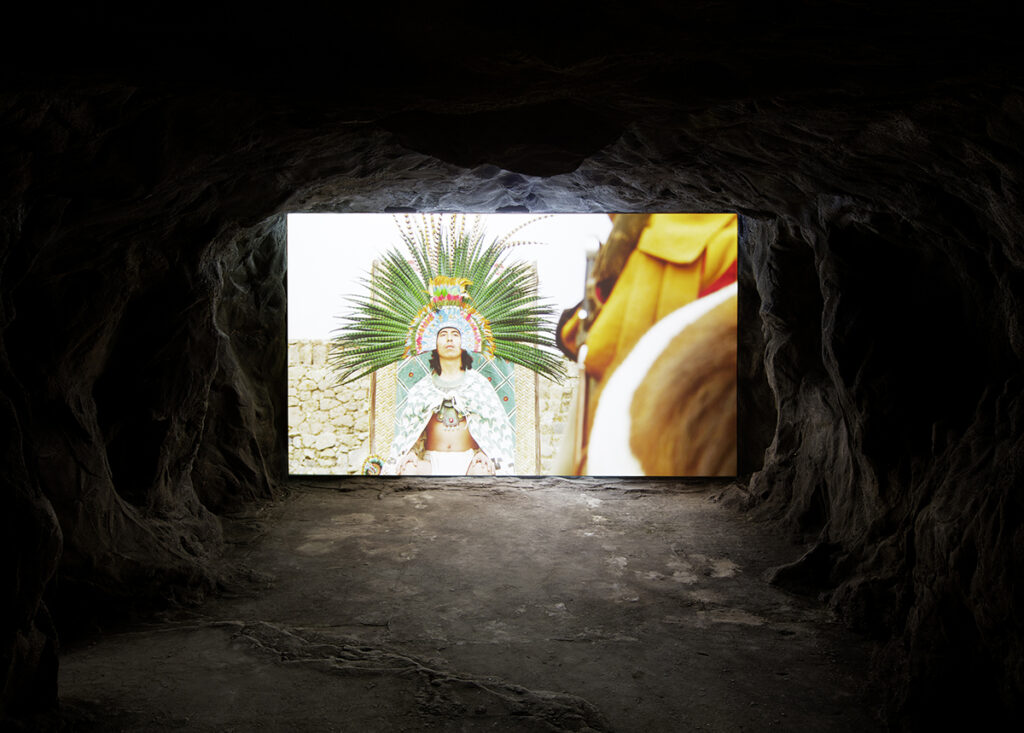Javier Téllez
The Conquest of Mexico
January 26 – March 28, 2013

Javier Téllez (*1969 in Valencia, Venezuela) wohnt und arbeitet in New York und Berlin. Seit nunmehr fast zwei Jahrzehnten beschäftigt sich Téllez als Künstler vorwiegend mit psychisch kranken Menschen.
Oft arbeitet er mit Patienten psychiatrischer Kliniken zusammen und schafft mit ihnen Filme und Videos, die die gemeinhin mit Geisteskrankheit verbundenen Stereotypen in Frage stellen. Zudem befasst er sich – wie Michèle Faguet schreibt – auf ethische Weise mit Gemeinschaften von Individuen, die nicht im Rahmen der Modelle eines normativen Verhaltens leben, sondern die ständig von der ideologisch bestimmten Struktur abweichen, die die soziale Ordnung bestimmt.
Téllez ist durch Antonin Artauds legendäre Reise 1936 nach Mexico und durch seinen Text Die Eroberung Mexicos von 1934 – Artaulds erstes Stück für sein Theater der Grausamkeit – zu seinem Film The Conquest of Mexico inspiriert worden, den er mit ambulant behandelten Patienten der psychiatrischen Klinik Fray Bernardino in Mexico City entwickelte. Die Patienten partizipierten dabei sowohl als Koautoren, als auch als Schauspieler; sie spielen in dem Film fiktionale Patienten des Krankenhauses und auch Personen der mexikanischen Geschichte; es treten auf: der frühere Azteken-Herrscher Montezuma, der spanische Eroberer Hernan Cortés und seine Übersetzerin und Geliebte La Malinche, sowie der französische Dichter und Dramatiker Antonin Artaud. Téllez hat The Conquest of Mexico in einer aufgelassenen Abteilung des Fray Bernardino-Krankenhauses, im Simón Bolivar-Theater in Mexico City, in Xochimilco, in Teotihuacan und bei den Pyramiden von Cantona gedreht. Der Film löst die Grenze zwischen Realität und Fiktion, zwischen Dokumentarfilm und Erzählung und zwischen Beobachtung und Beteiligung auf.
Wichtige Rollen spielen in Téllez’ Projekt ferner die spezifischen soziale und politischen Historien der Orte, an denen der Film entwickelt wurde, und ist insoweit vergleichbar mit den früheren Arbeiten O Rinoceronte de Dürer (Dürers Rhinozeros) (2010) und Rotations (Prometheus und Zwitter) (2011).
Der Film wurde 2012 von der Figge von Rosen Galerie in Zusammenarbeit mit der Galerie Peter Kilchmann für die dokumenta 13 produziert und dort zum ersten Mal gezeigt.
Javier Téllez (*1969 in Valencia, Venezuela) lives and works in New York and Berlin. For almost two decades now, mental illness has been one of the main subjects of
Téllez’ practice as an artist.
Working often in collaboration with psychiatric patients, it is the aim of Javier Téllez to produce films and videos that attempt to challenge the stereotypes associated with mental illness, and – as Michele Faguet stated in a text on the artist’s work – to “engage in an ethical manner with communities of individuals who live outside the models of normative behavior that define the parameters of a ‘sane’ society but that are constantly shifting in relation to the ideological structures that determine this social order”.
Inspired by Antonin Artaud‘s legendary 1936 trip to Mexico and his text ‘The Conquest
of Mexico’ (1934) – the first play for his Theater of Cruetly -, Javier Téllez collaborated with outpatients of the Fray Bernardino Psychiatric Hospital in Mexico City for this film. The patients, who are both co-writers of the script and act as the entire film cast, act in the film as fictional inmates of the hospital and as characters from Mexican history. The ancient ruler Moctezuma appears, along with the conqueror Hernan Cortés and his translator and lover La Malinche, as well as the French poet and playwright Antonin Artaud. Shot in an empty ward of the hospital and the Simón Bolivar Theatre, Xochimilco, Teotihuacan and the pyramids of Cantona, The Conquest of Mexico is a film that obliterates the boundaries between fact and fiction, documentary and story, observation and participation.
Important components of Téllez’ projects are further the specific social and political histories of the locations where the projects are developed, something which becomes apparent in the works of O Rinoceronte de Dürer (Dürerʼs Rhinoceros) (2010) and Rotations (Prometheus and Zwitter) (2011).
The film was produced in 2012 by Figge von Rosen Galerie and Galerie Peter Kilchmann for documenta 13; it was shown there for the first time.